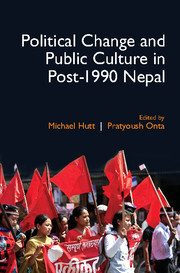Book contents
- Frontmatter
- Contents
- List of Figures
- Introduction Political Change and Public Culture in Post-1990 Nepal
- Part I Rumour
- Part II Ethnicity and Identity
- Part III Activist Cultures
- Part IV Gender and Resistance
- Part V Heritage
- 11 Publics of Heritage and Domestic Archives among Urban Nepalis of the Valley
- Contributors
- Index
11 - Publics of Heritage and Domestic Archives among Urban Nepalis of the Valley
from Part V - Heritage
Published online by Cambridge University Press: 23 July 2017
- Frontmatter
- Contents
- List of Figures
- Introduction Political Change and Public Culture in Post-1990 Nepal
- Part I Rumour
- Part II Ethnicity and Identity
- Part III Activist Cultures
- Part IV Gender and Resistance
- Part V Heritage
- 11 Publics of Heritage and Domestic Archives among Urban Nepalis of the Valley
- Contributors
- Index
Summary
While many have bemoaned the ‘loss of history’ in Nepal's confrontation with modernity, as in other places, this sense of loss is also what characterizes modernity1, particularly in the past two and a half decades of democratic reform. In this moment, history and heritage have become a more centrally-debated subject in the public sphere, and public urban spaces have become increasingly marked as relics or traces of the past. Ethnographers, political scientists, and cultural historians writing after the first Jan Andolan in 1990 have stressed the significance of this political transition for enabling new narratives of history. With new narratives of the cultural past, new political and cultural identities rise to the surface of social consciousness and vice versa, new political and cultural identities require new narratives of the cultural past (Lawoti, 2007; Tamang, 2008; Des Chene, 1996; Hangen, 2010; Onta and Humagain, this volume). It is no surprise that during the 1990s and early 2000s, many in Kathmandu began to write, rewrite, and preserve traces of their cultural or national heritage and their personal history through written memoirs (Hutt, 2012; Rai, this volume) and the preservation of objects and old homes.
Scholars looking into heritage and revised history primarily pay attention to the political stakes raised by emerging social groups and reform movements, and the narrative contexts of their attempts to change the state. Here I take a different approach. What does it mean to become part of a ‘public’ and how do public discourses that circulate around people influence their understanding of their possessions, their inheritance, and personal selves within a social world? How can we begin to think about the effect of the growing public sphere on people's personal projects, particularly the growing importance and desire to be recognized within publics to which they may not be an active, contributing participant or listener? Each of the stories I explore here engages with the question of how public discourses of history and heritage may, unwittingly and indirectly, affect individuals who are not directly a part of that public.
- Type
- Chapter
- Information
- Political Change and Public Culture in Post-1990 Nepal , pp. 253 - 272Publisher: Cambridge University PressPrint publication year: 2016
- 1
- Cited by



